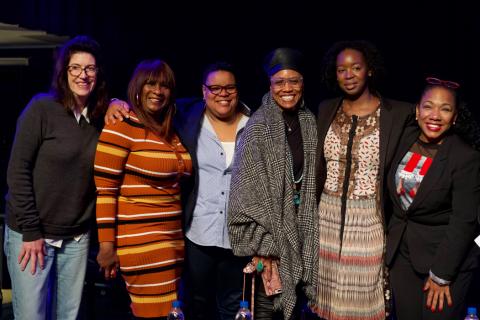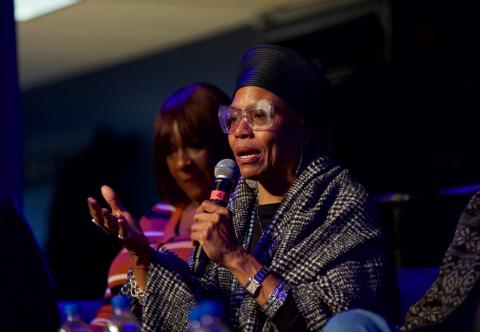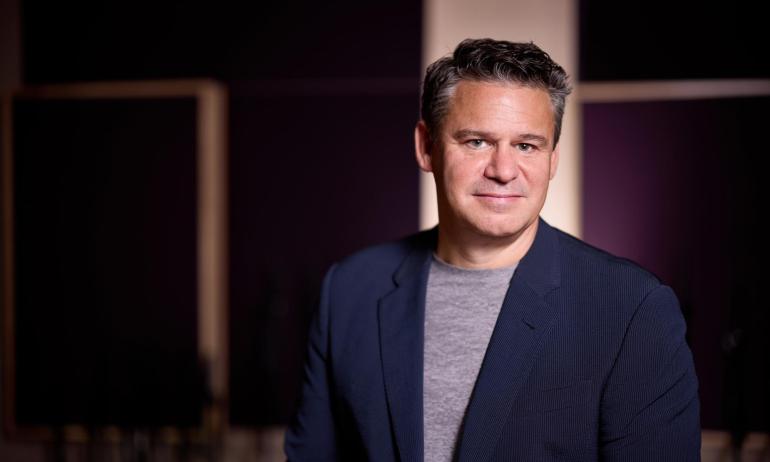Dee Dee Bridgewater Urges Women to Lift Each Other Up

From left: Susan Rogers, Tonya Butler, Tanya Darby, Dee Dee Bridgewater, Aja Burrell Wood, and Gabrielle Goodman
Image by Ben Pu

Dee Dee Bridgewater
Image by Ben Pu

Dee Dee Bridgewater
Image by Ben Pu
Women in the music industry, no matter their instrument, job title, or level of experience, often face discrimination because of their gender. Recently, jazz vocalist and visiting artist Dee Dee Bridgewater joined five Berklee faculty members for a wide-ranging discussion about shifting attitudes in the industry and the importance of supporting one another.
Moderator Aja Burrell Wood, managing director of Berklee's Institute of Jazz and Gender Justice, began by asking the panelists why such a discussion was necessary. “There’s still inequality,” Bridgewater said. Tanya Darby, chair of the Brass Department, agreed: “We wouldn’t be sitting here if everything was okay,” she said.
Tonya Butler, assistant chair of the Music Business/Management Department, mentioned the annual Billboard Power 100 list of influential people in the music industry. "I can't remember the last time there was a woman in the top 10," she said. "There aren't enough women in positions of leadership."
"I tell young women now: you just be the woman you want to be, whether that’s what society thinks you should be or not."
—Dee Dee Bridgewater
Gabrielle Goodman, a professor in the Voice Department, spoke of a widespread perception that women are less capable or less knowledgeable than men. “There’s always a moment of surprise—‘oh, these women really do know music!’” she said. “But if women are forceful and clear about what we want, even as a vocalist talking keys or tempos, we’re called names.”
Darby, a trumpet player, added that women are sometimes trapped by others’ assumptions about them, even other women. “I walk into a room and people assume I’m the vocalist,” she said. “They’re shocked to discover I’m a trumpet player. And a lead trumpet player? I’m a unicorn!” But, she admitted, she makes the same assumptions: “If another woman walks in, I’ll often assume she’s the vocalist. I’m guilty of all these things.”
Bridgewater agreed. “We often do the categorizing ourselves,” she said. “I tell young women now: you just be the woman you want to be, whether that’s what society thinks you should be or not.” She mentioned a mentoring program she is developing, aimed at young female musicians, since mentorship is a vital part of career advancement for many musicians, especially women.
The panel also included Susan Rogers, a professor in the Music Production and Engineering Department, and Maggie Scott, a professor in the Voice Department. Sharon Kramer, dean of institutional research, assessment, and accreditation, opened the event with a brief review of a report published this spring by Berklee in partnership with Women in Music. The report, "Women in the U.S. Music Industry: Obstacles and Opportunities," examined the breadth of women's experiences working in the music industry as performers, producers, teachers, engineers and more, and tells the story of their challenges and triumphs.
Bridgewater will perform a career-spanning Signature Series concert at the Berklee Performance Center on Wednesday, October 30, the one-year anniversary of the founding of the Berklee Institute of Jazz and Gender Justice. Tickets are available online and at the Berklee Performance Center box office.




